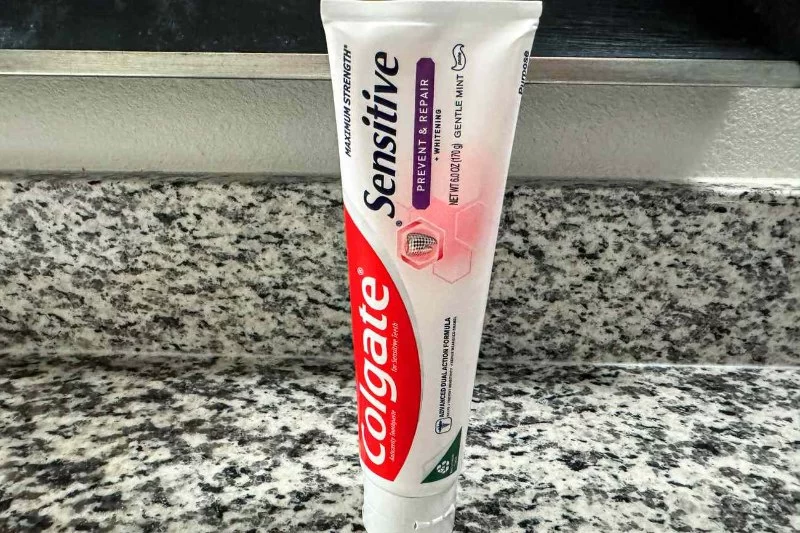
- 1-Understanding-Dental-Sensitivity
- 2-What-Makes-a-Toothpaste-Effective-for-Sensitive-Teeth
- 3-Top-Ingredients-for-Tooth-Sensitivity-Relief
- 4-Real-User-Experiences-and-Results
- 5-How-to-Use-Sensitive-Toothpaste-Correctly
- 6-Professional-Advice-from-Family-Dentistry-Online
1. Understanding Dental Sensitivity
Tooth sensitivity can turn everyday moments — like sipping coffee or enjoying ice cream — into painful experiences. It occurs when the protective enamel layer on your teeth wears down, exposing the underlying dentin and nerve endings. Common causes include aggressive brushing, acidic foods, teeth grinding, or even gum recession. Understanding what triggers sensitivity is the first step toward finding the best toothpaste for sensitive teeth relief.
Unlike temporary discomfort, ongoing sensitivity can indicate enamel erosion or cavities that need professional care. That’s why choosing the right toothpaste plays a crucial role not just in comfort, but in long-term dental health. The right formula helps rebuild enamel, block pain signals, and restore confidence in your smile.
2. What Makes a Toothpaste Effective for Sensitive Teeth
2.1 Desensitizing Agents That Target Pain
High-quality toothpastes for sensitive teeth typically include ingredients such as potassium nitrate or stannous fluoride. These agents work by calming the nerves inside the tooth or by forming a protective layer over exposed dentin. Over time, consistent use helps reduce the sharp pain caused by temperature changes or pressure.
2.2 Enamel-Strengthening Formulas
Enamel repair is essential for lasting relief. Look for fluoride-based toothpastes that help remineralize weakened enamel. This not only prevents further damage but also strengthens the teeth against future sensitivity. According to dental professionals, products containing sodium fluoride or calcium phosphate are among the most effective in rebuilding enamel structure.
3. Top Ingredients for Tooth Sensitivity Relief
When comparing different products, focus on ingredients that deliver proven results. Some of the most effective components found in the best toothpaste for sensitive teeth relief include:
3.1 Potassium Nitrate
This ingredient works by desensitizing the nerves within your teeth. Regular use reduces the discomfort caused by cold, hot, or sweet foods, allowing you to eat and drink without hesitation.
3.2 Stannous Fluoride
Beyond cavity prevention, stannous fluoride creates a protective barrier that seals exposed dentin. It’s often recommended by dentists for patients who have both sensitivity and early signs of enamel erosion.
3.3 Arginine and Calcium Carbonate
Some newer formulas use arginine to naturally block pain pathways and restore mineral balance. Combined with calcium carbonate, it helps reinforce tooth structure without harsh abrasives, making it gentle enough for daily use.
4. Real User Experiences and Results
Many users who switched to dentist-recommended sensitive toothpastes report noticeable relief within one to two weeks. One user shared that after years of avoiding ice water, she finally enjoyed cold drinks again thanks to a toothpaste with potassium nitrate. Another user noted that their enamel felt stronger and smoother after three months of consistent use with a fluoride-based formula.
These personal stories emphasize that finding the right product can transform your daily comfort and confidence. However, results depend on consistency and proper brushing techniques — something that’s often overlooked when people seek quick fixes.
5. How to Use Sensitive Toothpaste Correctly
5.1 Brush Gently, Not Aggressively
Brushing harder doesn’t clean better — it actually worsens sensitivity by wearing down enamel and irritating gums. Use a soft-bristled toothbrush and apply gentle, circular motions for two minutes twice a day.
5.2 Don’t Rinse Immediately
After brushing, avoid rinsing your mouth right away. Allowing the fluoride to stay on your teeth helps maximize its protective benefits. Spit out excess foam, but let a thin layer remain on the enamel for better absorption.
5.3 Combine with a Desensitizing Mouthwash
For enhanced results, pair your toothpaste with an alcohol-free mouthwash designed for sensitive teeth. This helps reinforce the protective coating and provides all-day comfort against irritants.
6. Professional Advice from Family Dentistry Online
At Family Dentistry Online, our dental professionals emphasize that the right toothpaste is only part of the solution. Regular dental check-ups, proper brushing habits, and avoiding acidic foods all contribute to long-term relief. If your sensitivity persists after using specialized toothpaste for several weeks, it may signal underlying issues such as enamel loss or gum disease that require professional evaluation.
We recommend exploring our curated selection of clinically tested products and expert oral care tips at Family Dentistry Online. Finding the best toothpaste for sensitive teeth relief is not just about comfort — it’s about protecting your smile for years to come with professional-grade guidance and trusted recommendations.







 Mayfair Family Dentistry4.0 (435 review)
Mayfair Family Dentistry4.0 (435 review) Ewing Dental Associates4.0 (334 review)
Ewing Dental Associates4.0 (334 review) Willamette Dental Group - Portland - Jefferson4.0 (151 review)
Willamette Dental Group - Portland - Jefferson4.0 (151 review) Thornton Park Dental Arts4.0 (736 review)
Thornton Park Dental Arts4.0 (736 review) Dr. Steven Harrison, DDS5.0 (7 review)
Dr. Steven Harrison, DDS5.0 (7 review) Smile Haus4.0 (292 review)
Smile Haus4.0 (292 review) The Importance of Oral Health Education During Pregnancy for a Healthy Pregnancy
The Importance of Oral Health Education During Pregnancy for a Healthy Pregnancy Best Tips for Brushing Your Teeth Properly for Healthy Gums: Essential Techniques for Oral Health
Best Tips for Brushing Your Teeth Properly for Healthy Gums: Essential Techniques for Oral Health Why Skipping Dental Checkups Can Lead to Bigger Oral Health Problems
Why Skipping Dental Checkups Can Lead to Bigger Oral Health Problems Advantages of Porcelain Dental Restorations
Advantages of Porcelain Dental Restorations How Can Diabetes Cause Tooth and Gum Problems? Preventing and Managing Oral Health Issues
How Can Diabetes Cause Tooth and Gum Problems? Preventing and Managing Oral Health Issues Healthy Habits for Promoting Good Oral Health and Hygiene: Tips for a Healthy Smile
Healthy Habits for Promoting Good Oral Health and Hygiene: Tips for a Healthy Smile